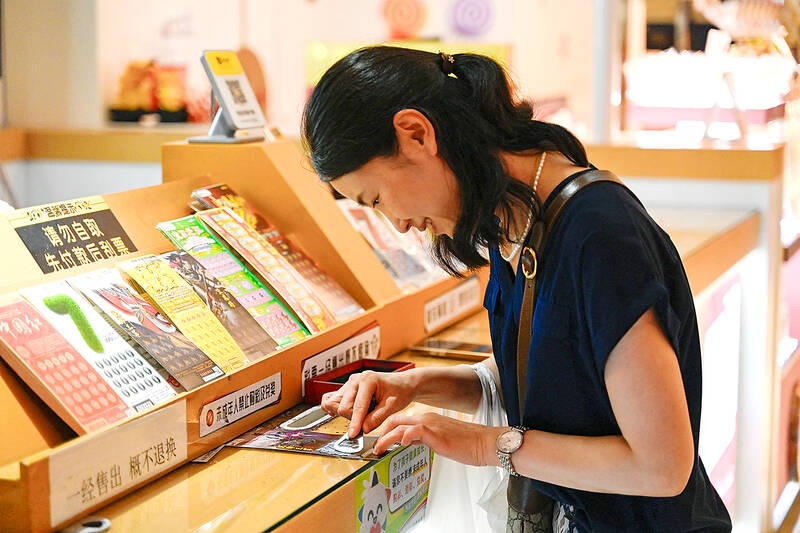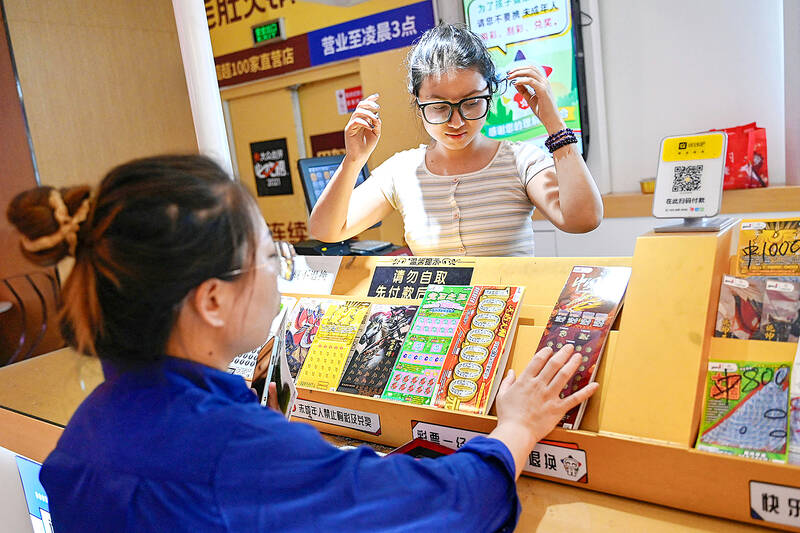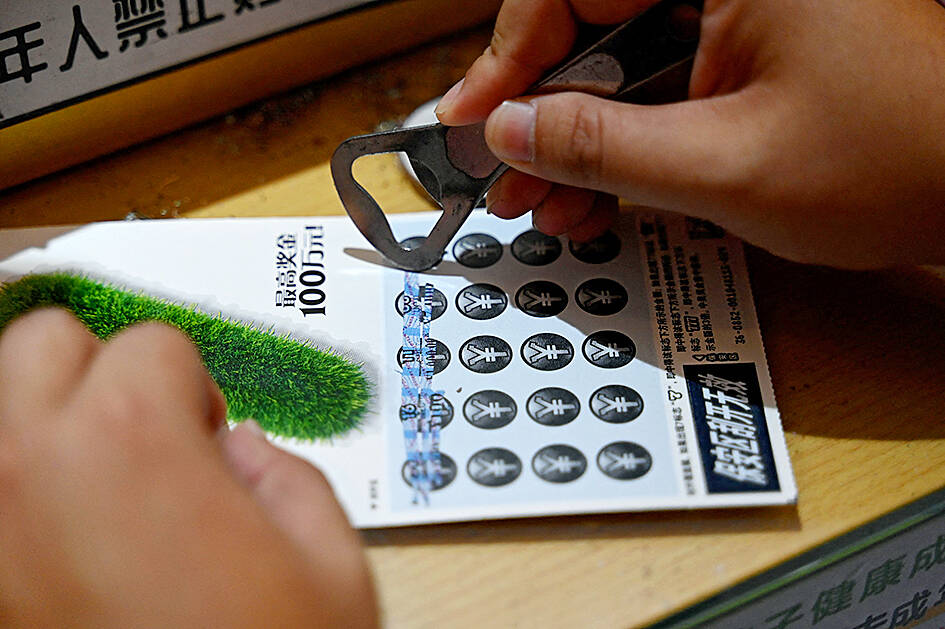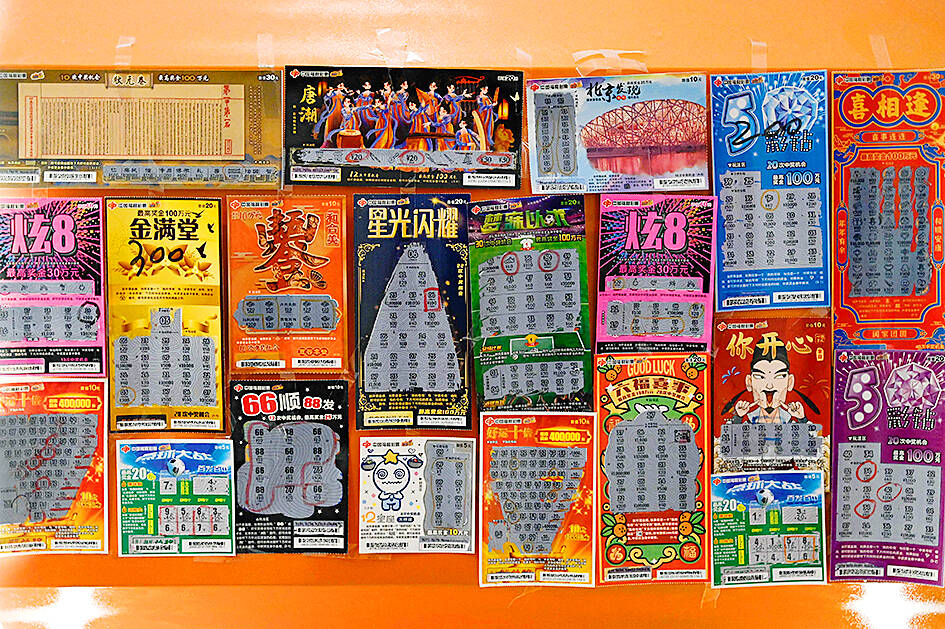Chinese livestreamer Chen Ying has spent more than 100,000 yuan (around US$14,000) on lottery scratch cards, which she systematically scrapes through on camera for her followers on social media platform Douyin.
But Chen, 28, is not playing to win in the traditional sense, despite China’s faltering economy offering little chance of a bonanza for young people.
Instead, she’s leveraging the increasing popularity of the lottery among young people in China to build up her follower count — a gamble that paid off when her fanbase went from a few hundred to more than 45,000 in the space of six months. Lottery sales in China soared to almost 274 billion yuan in the first half of the year, an increase of more than 50 percent year-on-year, with analysts pointing to a growing economic malaise as a possible explanation.

Photo: AFP
“I think it may be because it is not easy to make money now, especially when college graduates and unemployed people can’t find a suitable job, which makes them grasp onto the idea of getting rich suddenly,” said Chen, who is based in central Hunan province.
Months of disappointing economic data have confirmed China’s post-pandemic recovery is slowing, with the risk of prolonged deflation looming.
China announced on Tuesday it would suspend the release of youth unemployment figures, after previous sets of data hit record levels for several months in a row. Many of Chen’s followers are college students, and one-third are under the age of 23, according to their profiles.

Photo: AFP
“In people’s subconscious, the opportunity to get rich through labour is decreasing, so they are more willing to ‘take a chance’ through the lottery to see if they can get rich overnight through luck,” Huang Zhenxing, a professor at Shanghai University of Finance and Economics, told Chinese media Caijing recently. “It also means that people have little confidence in the current economy.”
On Douyin, Chen’s fans tune in for the vicarious thrill of seeing her tear through cards, leaving messages under the videos detailing their own luck.
“The possibility of... achieving overnight wealth is small,” Chen said matter-of-factly, something made clear to her audience by her repeated failures to win big. “Basically I’m trying to get popularity... and have more people get to know me and my brand.”

Photo: AFP
‘SENSE OF POSSIBILITY’
Chen is far from the only influencer to have jumped on the lottery bandwagon. Videos tagged with scratch card brand “Guaguale” — “scratch, scratch, happy” — have been viewed more than 6.7 billion times on Douyin, while there are 120 million views under the topic #Guaguale on Xiaohongshu. Curtis Cheng, 25, has found himself buying scratch cards more this year and has noticed he is not alone — at lunch and dinner time, the lottery stand near him is surrounded by young people.
“It’s a kind of small lucky feeling,” Cheng said. “It’s not a big deal if you don’t win, it’s just a way to spice up your life.”

Photo: AFP
But he said he thought there was also a deeper issue at play related to economic confidence.
“I think it’s probably because young people need a sense of possibility,” he said. “They need some luck to help them improve their current situation.”
Erika Cui, who works in the IT industry, said a scratch card provided a brief second of escape.
“The feeling of not having to think about my bad life because I’m so excited about the moment is much better than winning the lottery or not winning itself!” she said. “The economy hasn’t been very good over the years... the pressure of work and life is quite high, and everyone’s mental state is really worrying,” the 25-year-old said.
Cui linked the increasing popularity of the lottery to a burgeoning dropout culture that pushes back against China’s often intense study and work pressure.
“I feel that it is more of a self-deprecating state of ‘life is like this, why don’t we play a scratch card for fun, what if I win the lottery?’”

Towering high above Taiwan’s capital city at 508 meters, Taipei 101 dominates the skyline. The earthquake-proof skyscraper of steel and glass has captured the imagination of professional rock climber Alex Honnold for more than a decade. Tomorrow morning, he will climb it in his signature free solo style — without ropes or protective equipment. And Netflix will broadcast it — live. The event’s announcement has drawn both excitement and trepidation, as well as some concerns over the ethical implications of attempting such a high-risk endeavor on live broadcast. Many have questioned Honnold’s desire to continues his free-solo climbs now that he’s a

Francis William White, an Englishman who late in the 1860s served as Commissioner of the Imperial Customs Service in Tainan, published the tale of a jaunt he took one winter in 1868: A visit to the interior of south Formosa (1870). White’s journey took him into the mountains, where he mused on the difficult terrain and the ease with which his little group could be ambushed in the crags and dense vegetation. At one point he stays at the house of a local near a stream on the border of indigenous territory: “Their matchlocks, which were kept in excellent order,

Jan. 19 to Jan. 25 In 1933, an all-star team of musicians and lyricists began shaping a new sound. The person who brought them together was Chen Chun-yu (陳君玉), head of Columbia Records’ arts department. Tasked with creating Taiwanese “pop music,” they released hit after hit that year, with Chen contributing lyrics to several of the songs himself. Many figures from that group, including composer Teng Yu-hsien (鄧雨賢), vocalist Chun-chun (純純, Sun-sun in Taiwanese) and lyricist Lee Lin-chiu (李臨秋) remain well-known today, particularly for the famous classic Longing for the Spring Breeze (望春風). Chen, however, is not a name

Lines between cop and criminal get murky in Joe Carnahan’s The Rip, a crime thriller set across one foggy Miami night, starring Matt Damon and Ben Affleck. Damon and Affleck, of course, are so closely associated with Boston — most recently they produced the 2024 heist movie The Instigators there — that a detour to South Florida puts them, a little awkwardly, in an entirely different movie landscape. This is Miami Vice territory or Elmore Leonard Land, not Southie or The Town. In The Rip, they play Miami narcotics officers who come upon a cartel stash house that Lt. Dane Dumars (Damon)